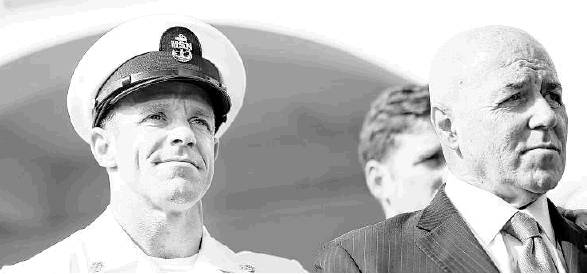Thumb on the scale
Military justice is actively damaged if the commander in chief keeps prejudging cases.
When the president spoke out against military members accused of misconduct, saying they should be “prosecuted, stripped of their positions, court-martialed, fired, dishonorably discharged,” his actions were inappropriate and ran afoul of a key principle enshrined in the uniform code of military justice.
A military judge found that the president’s words — aimed at those who committed sexual assault in the military —were a case of unlawful command influence. Frequently cited by courts as a “mortal enemy of military justice,” such influence occurs when comments by a commander or civilian leader appear likely to affect the outcome of a court-martial.
This was as true six years ago — when it was President Barack Obama doing the talking — as it is today.
Yet Obama’s transgression now seems almost quaint in a time when President Donald Trump regularly comments on cases against errant military members that have not yet even been resolved, such as when he defended a Green Beret accused of killing an alleged bomb-maker by saying, “We train our boys to be killing machines, then prosecute them when they kill!”
These actions are unacceptable and actively damage our military, sabotaging discipline and effectiveness by running counter to the very ideals that our armed forces are sworn to defend.
“What President Trump is doing is helping undermine military good order and discipline,” said Rachel VanLandingham, a professor at Southwestern Law School and former judge advocate in the U.S. Air Force. “He is undermining writ large the U.S. military and national security objectives because of the example he is setting.”
It gets worse.
The New York Times reported recently that officials who have watched Trump’s vigorous backing of former Special Operations Chief Edward Gallagher — a decorated officer charged with shooting civilians and killing a captured Islamic State fighter — hesitated to punish him for misconduct revealed in his court-martial, including drug use and theft.
Given Trump’s vocal championing of Gallagher, who was subsequently acquitted of murder but found guilty and demoted over a lesser charge, Navy leaders are afraid the SEAL chief is untouchable. Trump had already spoken of pardoning him and ordered the withdrawal of military awards for the Navy attorneys who led the unsuccessful prosecution.
This goes beyond unlawful command influence and brings up another military term the president ignores at our peril: command responsibility.
A commander is responsible for ensuring that troops follow the law of armed conflict, as well as holding them accountable if they don’t. This is essential for high morale and upholding the honor of military service.
It keeps our troops safe by ensuring discipline and that orders are followed. It rewards the trust that American families put in our fighting forces as they send their sons and daughters off to war. It guarantees lasting and longer peace by not alienating populations you are trying to win over.
Most human beings find it difficult to take a life, yet that is what we train our soldiers to do. This is sustainable only if their actions exist within a legal framework, VanLandingham said, and where those who step over the line face consequences.
“The law of armed conflict helps our soldiers maintain their moral compass in war,” she said.
Our military supremacy doesn’t simply depend on us having the most firepower, it comes from us taking our values into battle. This is lost on Trump, who seems to reduce war to its most basic element of one side killing another — of carnage with no regard for morality.
American troops deserve more from their commander in chief.
